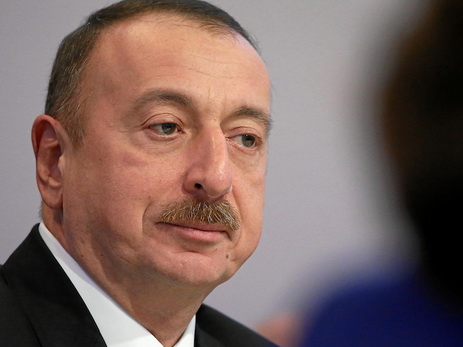Brussels Rolls out the Red Carpet for Azerbaijan

In February, the European Union rolled out the red carpet for the official visit of Azerbaijan’s President Ilham Aliyev for the inauguration of the new EU-Azerbaijan “Strategic Partnership Agreement.”
During the visit, President Aliyev called the new agreement a “new chapter” in Azerbaijan-EU relations and touched upon the significance of energy cooperation, notably that of the Southern Gas Corridor project (SGC) for Europe and reiterated his disappointment for the unresolved Nagorno-Karabakh conflict.
Donald Tusk, the president of the European Council, heralded the strategic importance of Azerbaijan for the EU’s energy security and noted the inadmissibility of the status quo regarding the Nagorno-Karabakh conflict, but endorsed mediation efforts to find a peaceful settlement. Tusk underscored the EU’s traditional endorsement for Azerbaijan’s sovereignty and territorial integrity.
One of the priority topics in the bilateral EU-Azerbaijan dialogue is the unresolved Nagorno-Karabakh conflict, which is a legacy of the 1988-1994 Karabakh War which resulted in the occupation of Azerbaijan’s territories by Armenia. All principal and interested stakeholders consider the existing status-quo unacceptable, however, Baku is frustrated by the EU’s passive role on the Nagorno-Karabakh conflict.
Previously the European Parliament demonstrated a clear stance in its resolutions on Azerbaijan’s territorial integrity and on withdrawal of Armenian military forces and on return of internally displaced people, a position that the EU has gradually weakened. The EU’s diplomatic indifference was obvious by supporting the territorial integrity of Azerbaijan on the one hand and the “right for self-determination of people” in the case of Armenia on the other.
Azerbaijan expects a clear position from the EU on the conflict’s settlement in accordance with international law. The EU prefers a balanced and diplomatic approach towards the Nagorno-Karabakh conflict without distinguishing between the “who is occupied” and the “who is occupying.”
Energy dialogue is a major dimension of cooperation between Azerbaijan and the EU. The signing of the “Memorandum of Understanding on the strategic partnership in energy field” (2006) and the “Joint Declaration on the Southern Gas Corridor” (2011) between the EU and Azerbaijan were legal foundations of energy relations and of high importance in terms of security for the EU’s energy supply, sustainability and smooth implementation of the SGC project and determination of bilateral energy cooperation with Azerbaijan.
The SGC, which committed Azerbaijan to supplying substantial volumes of natural gas to Europe in 2020, is crucially important for the EU, since it will contribute to diversifying energy sources and give energy companies leverage to negotiate gas prices with third party suppliers. The ongoing successful realization of the SGC is an example of the “real project management,” which previously was lacking in the case of the Nabucco project, with the involvement of member states and candidate countries.
Azerbaijan is an important strategic partner for the EU in terms of realizing large-scale energy and transportation projects within the East-West transportation corridor. Relations with the EU enabled Azerbaijan to eradicate the Soviet legacy in its economy and institutional structures by embarking on a comprehensive reform policy.
The EU’s technical and financial assistance was a crucial contributor to Azerbaijan’s transition from ‘Sovietization’ to an independent state-building process since its independence. In the light of volatile oil prices, the EU is a vital partner for Azerbaijan in terms of benefiting from the former’s experience in economic diversification and the development of non-oil sectors.
Whereas, Azerbaijan, instead of pursuing a radical pro-European foreign policy towards the EU, opted for a multi-vector foreign policy approach. Despite deteriorated relations with the EU, Azerbaijan has shown no interest in joining the Russia-dominated Eurasian Economic Union, which is a mirror organization of the EU.
Azerbaijan has structured its foreign policy around pragmatic principles, rather than sticking to ideological patterns or isolating itself through absolute polarization by joining certain economic/military blocs. Thus, EU-Azerbaijan relations have turned out to be one of the pragmatic dimensions of Azerbaijan’s foreign policy.
Therefore, the EU itself, instead of isolating Azerbaijan by strict regulations, should better engage with Azerbaijan in order to modernize and transform the country. At the same time, the EU’s position in regard to the Nagorno-Karabakh conflict and to the occupation, which has dealt a serious blow to Azerbaijan’s sovereignty, should be in accordance with international law and be rather operational, but not declarative.
Ilgar Gurbanov is a Research Fellow for Centre for Strategic Studies (Azerbaijan).














